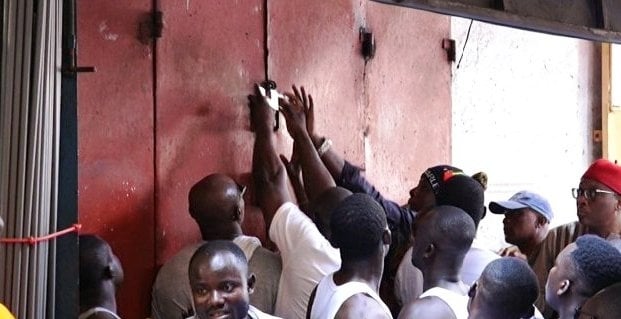The escalating tension at Abossey Okai, Ghana’s largest spare parts market, centers around the enforcement of the Ghana Investment Promotion Centre (GIPC) Act, 2013 (Act 865), specifically Section 27(1), which restricts foreign nationals from engaging in certain retail activities, including petty trading, hawking, and operating in designated market spaces. The Abossey Okai Spare Parts Dealers Association took matters into their own hands, attempting to forcibly evict foreign traders, creating a volatile standoff and raising concerns about potential diplomatic repercussions. Professor Michael Ayamga-Adongo, Deputy Chief Executive Officer of the Environmental Protection Authority (EPA), has publicly condemned the association’s actions, emphasizing that enforcement of investment laws is the exclusive purview of state authorities, not private entities.
Professor Ayamga-Adongo has cautioned the association against vigilante enforcement, stressing the legal and diplomatic ramifications of their actions. He underscored that the responsibility for monitoring and regulating compliance with the GIPC Act rests with dedicated state institutions, including law enforcement and the Ghana Immigration Services, working in conjunction with other relevant agencies. The professor warned that the association’s unauthorized actions could provoke retaliatory measures from other countries where Ghanaian citizens conduct business, potentially jeopardizing their livelihoods and international relations. This concern stems from the possibility of reciprocal actions by foreign governments in response to perceived mistreatment of their citizens in Ghana.
The association’s unilateral move to enforce the law has been met with criticism, primarily due to the potential for sparking international tensions and trade disputes. Professor Ayamga-Adongo highlighted the delicate balance required in enforcing national laws while respecting international trade agreements and maintaining positive diplomatic relations. He argued that the association’s actions could be interpreted as discriminatory and xenophobic, undermining Ghana’s image as a welcoming and stable environment for foreign investment. This self-appointed role of enforcement also raises concerns about due process and the potential for arbitrary application of the law, which could disproportionately affect smaller traders and those lacking the resources to navigate complex legal procedures.
Despite the strong warning from the EPA Deputy Chief Executive Officer and potential diplomatic consequences, the Abossey Okai Spare Parts Dealers Association has remained defiant. They issued a three-day ultimatum to foreign traders, demanding they cease operations or face unspecified consequences. This uncompromising stance escalates an already tense situation and further emphasizes the association’s disregard for the authority of the government and its designated enforcement agencies. The ultimatum raises the specter of further confrontations and potential violence, further jeopardizing the stability of the market and potentially impacting the broader business environment.
The government’s response to this challenge is crucial. It needs to assert its authority while addressing the concerns raised by local traders. A balanced approach is required, involving clear communication of the existing laws, consistent enforcement by designated agencies, and open dialogue with all stakeholders, including both local and foreign traders. This will ensure fair competition, protect the rights of all involved, and maintain Ghana’s reputation as a reliable trading partner. Failure to address this situation decisively could lead to further unrest and potentially damage Ghana’s international standing.
This situation underlines the complexities of balancing national interests, legal frameworks, and international relations in an increasingly globalized world. The government must act decisively to restore order and prevent further escalation while simultaneously addressing the underlying concerns that led to the association’s actions. A collaborative approach, involving all relevant stakeholders, is essential to achieving a sustainable solution that respects the rule of law, promotes fair competition, and safeguards Ghana’s international reputation. The long-term stability and prosperity of the Abossey Okai market, and indeed the broader Ghanaian economy, depend on a swift and effective resolution to this challenging situation.














